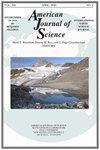Insights Into the Terminal Ediacaran Marine Carbonate Record From Shale-Hosted Carbonate Carbon Isotopes
IF 2.5
3区 地球科学
Q3 GEOSCIENCES, MULTIDISCIPLINARY
引用次数: 0
Abstract
The marine carbon isotope record (δ 13 C) used for chemostratigraphy and reconstruction of carbon cycle dynamics is commonly assembled using carbonate rocks. There is, however, evidence that carbonate cements hosted within fine-grained clastics (shales and mudstones) in some settings may also express δ 13 C trends that covary with the record from carbonates. We present new carbon and oxygen isotopic data from shale-hosted carbonate cements (herein termed δ 13 C carb-sh and δ 18 O carb-sh, n = 107, <16 wt% CaCO 3 ) of the terminal Ediacaran Nama Group, Namibia (≥550.5 to <539.6 Million years ago; Ma). These data are compared with the published carbon and oxygen isotopic record from coeval carbonates (δ 13 C carb and δ 18 O carb , n = 1611) and total organic carbon (TOC) concentrations. We show that, in the Nama Group, δ 13 C carb-sh compositions in samples of intermediate to high CaCO 3 /TOC (>0.4) can approximate contemporaneous δ 13 C carb in open marine mixed carbonate-clastic settings. By contrast, δ 13 C carb-sh values in samples with low CaCO 3 /TOC (<0.4) that were deposited in clastic settings distant from the locus of carbonate deposition are more negative than contemporaneous δ 13 C carb . These data suggest that δ 13 C carb-sh may approach seawater composition in samples with low TOC when deposited in settings characterized by high CO 3 2- concentration, where carbonate can rapidly precipitate from seawater during early diagenesis. However, the use of δ 13 C carb-sh to infill gaps in the existing δ 13 C carb record remains uncertain, even when these criteria are fulfilled. Intervals of δ 13 C-δ 18 O co-variability in the Nama Group succession appear to correlate with units where seawater mixing with meteoric fluids was more likely during early diagenesis, such as clastic-dominated settings, which also show significant decreasing δ 18 O through time with gradual sub-basin infill. We further consider uncertainties in lithostratigraphic correlation of the upper Urusis Formation of the Nama Group that enable three new possible correlations to be proposed for δ 13 C carb-sh data within the terminal Ediacaran to lower Cambrian (<542.65 Ma to >532 Ma) regional and global δ 13 C carb records.从页岩碳酸盐碳同位素研究埃迪卡拉纪晚期海相碳酸盐记录
用于化学地层学和碳循环动力学重建的海相碳同位素记录(δ 13c)通常使用碳酸盐岩进行组合。然而,有证据表明,在某些环境下,在细粒碎屑(页岩和泥岩)中的碳酸盐胶结物也可能表达与碳酸盐记录共同变化的δ 13c趋势。本文介绍了来自纳米比亚埃迪卡拉末期Nama群(≥550.5 ~ 5.396亿年前)页岩型碳酸盐胶结物(这里称为δ 13c碳水化合物-sh和δ 18o碳水化合物-sh, n = 107, <16 wt% caco3)的新的碳氧同位素数据。马)。将这些数据与同期碳酸盐(δ 13c碳水化合物和δ 18o碳水化合物,n = 1611)的碳氧同位素记录和总有机碳(TOC)浓度进行了比较。研究表明,在Nama群中,中高caco3 /TOC (>0.4)样品的δ 13c碳水化合物组成与开阔海相混合碳酸盐岩-碎屑环境中同期δ 13c碳水化合物组成相近。相比之下,在远离碳酸盐岩沉积地点的碎屑环境中沉积的低caco3 /TOC (<0.4)样品的δ 13c碳水化合物-sh值比同时期的δ 13c碳水化合物更负。这些数据表明,当沉积在具有高co32 -浓度的环境中,碳酸盐在早期成岩作用中迅速从海水中析出时,δ 13c碳水化合物可能接近于低TOC样品的海水组成。然而,即使满足这些标准,利用δ 13c碳水化合物-sh来填补现有δ 13c碳水化合物记录的空白仍然不确定。Nama群演替中δ 13c -δ 18o共变区间与早期成岩作用中海水与大气流体混合的可能性较大的单元(如碎屑岩为主的环境)有关,δ 18o随时间的推移也随着次盆地的逐渐充填而显著降低。我们进一步考虑了Nama群上乌鲁西组岩石地层对比的不确定性,从而提出了埃迪卡拉末至下寒武统(<542.65 Ma至>532 Ma)区域和全球δ 13c碳水化合物记录的三种新的可能对比。
本文章由计算机程序翻译,如有差异,请以英文原文为准。
求助全文
约1分钟内获得全文
求助全文
来源期刊

American Journal of Science
地学-地球科学综合
CiteScore
5.80
自引率
3.40%
发文量
17
审稿时长
>12 weeks
期刊介绍:
The American Journal of Science (AJS), founded in 1818 by Benjamin Silliman, is the oldest scientific journal in the United States that has been published continuously. The Journal is devoted to geology and related sciences and publishes articles from around the world presenting results of major research from all earth sciences. Readers are primarily earth scientists in academia and government institutions.
 求助内容:
求助内容: 应助结果提醒方式:
应助结果提醒方式:


